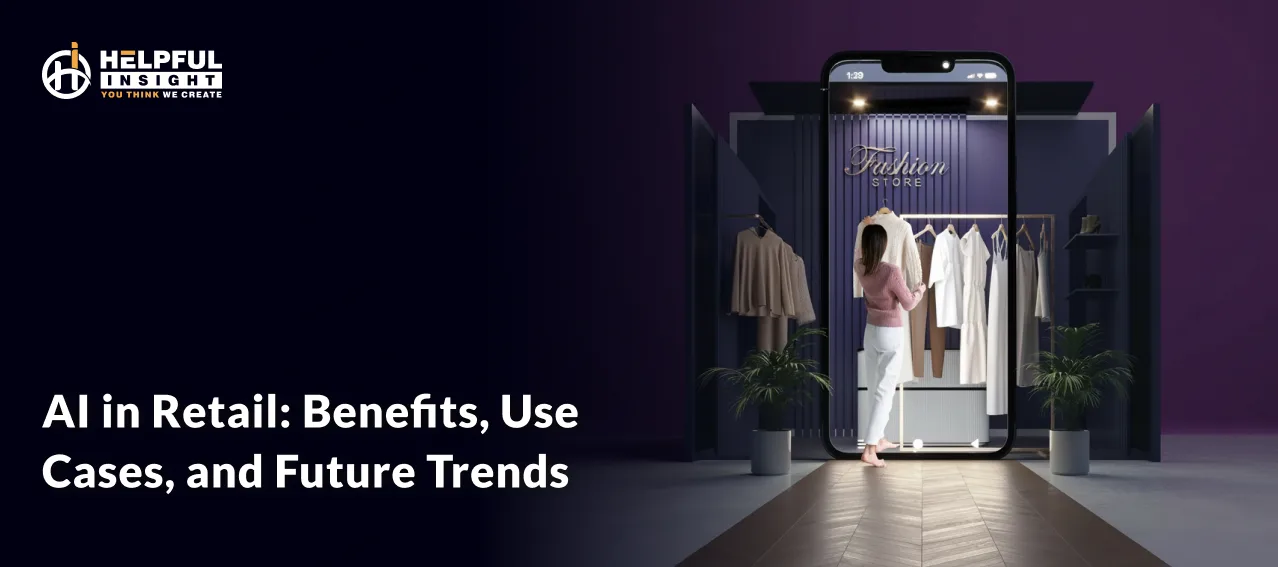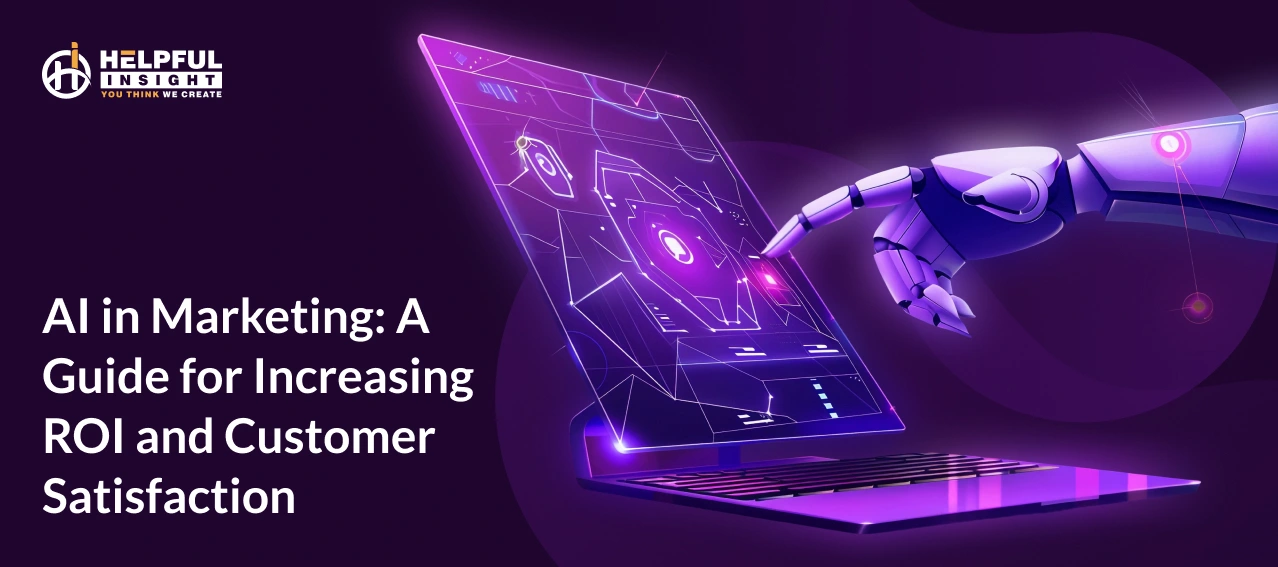Do you remember the times when there was no digital transformation in the e-commerce marketplaces? The market functions on traditional marketing. It means there were no websites, no marketing tactics. This signifies a comparison to what was happening in the past and present era. Today, there is a rise in the e-commerce world. You know by what? Through generative AI, of course. It is a technology through which you can instantly get personalized choices when you go to a certain website. To enhance your experience further, generative AI chatbots are making things easier for you by understanding what you want. Even across the way out, technology plays a vital role in it. To know about technological aspects and AI services, you can take the help of AI development service providers to see how it has changed the entire scenario of the e-commerce platforms.
To describe the whole scenario described above, this is called generative AI in eCommerce. There are big brands in this space that are adopting this technology. If you want to know how these kinds of technologies are making a difference, there are various use cases of generative AI in eCommerce that can help you further.
Market Statistics of Generative AI in e-commerce & Why it Matters
The global generative AI in eCommerce was at $1.98 billion in 2022 and can reach $22.02 billion by 2030 at a CAGR of 36.1% from 2023 to 2030. Personalization options generated by generative AI can boost sales by up to 20-30%. The E-commerce industry is accelerating at its own pace. Traditional marketing is no longer being adopted, even when it comes to marketing products in the digital world. This approach is not enough to meet customer expectations. Shoppers are more inclined towards instant responses, smooth integration, and demand customization options every step of the way. Various B2B companies are using generative AI in eCommerce. In the present era, people don’t want a lengthy process; instead, they want a tech-savvy solution.
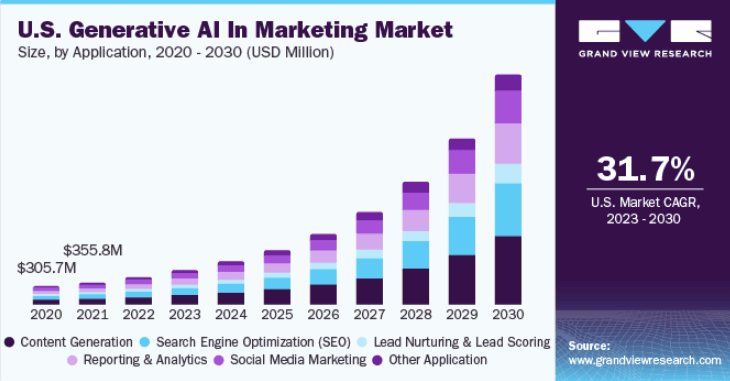
10 Use Cases of Generative AI in E-commerce & How it is Changing the E-commerce Industry
Are you looking for various amazing generative AI use cases in eCommerce? Let’s know how generative AI can change the retail and e-commerce industry.
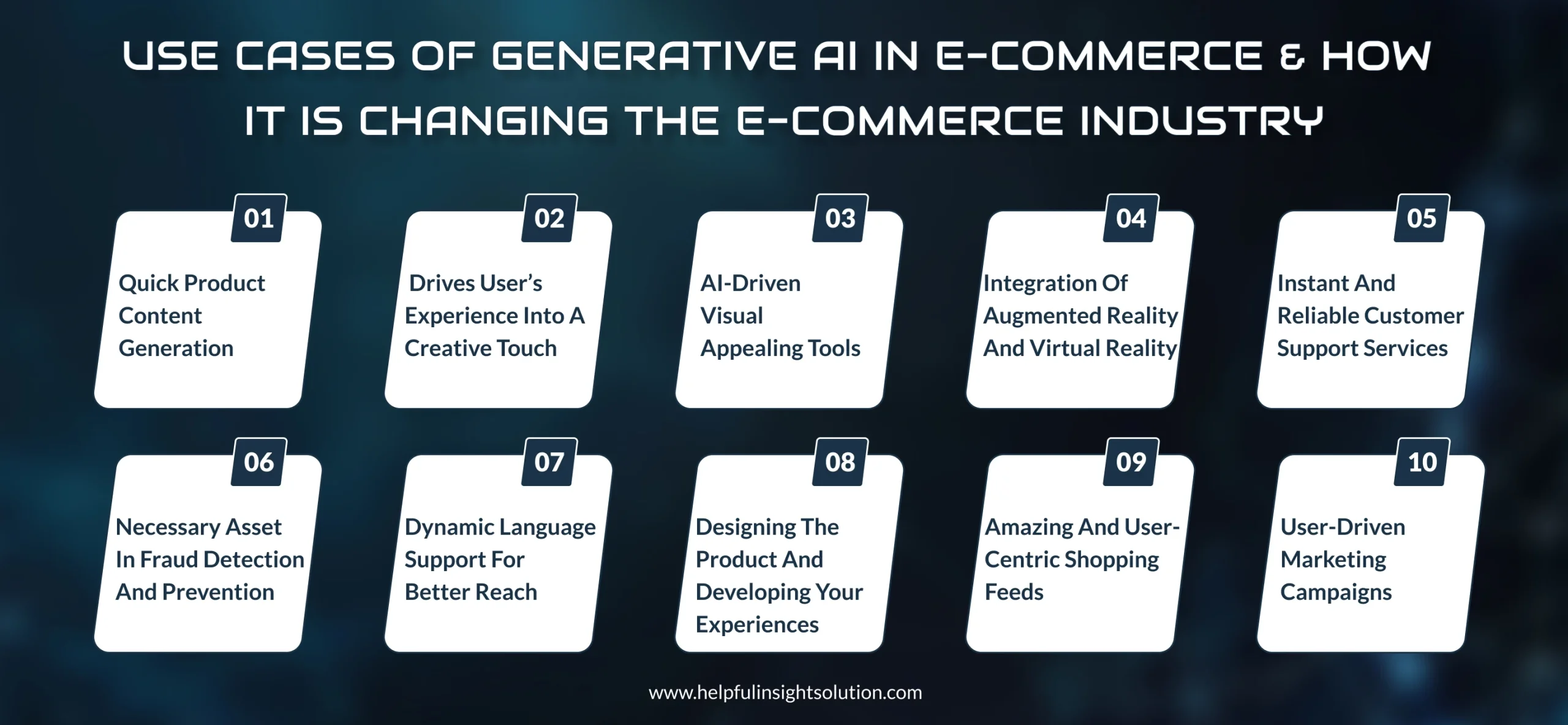
1. Quick Product Content Generation
Creating product content can be a tough choice. Previously, if you talked about writing product descriptions, monotonous general product descriptions were written that did not work. But generative AI in eCommerce has changed the whole scenario. In today’s era, sellers working on small marketplaces or big marketplaces can easily list their products on any e-commerce app in few minutes rather than spending long hours. After all, that’s what AI does in the present era, as it creates engaging and purposeful product descriptions in one go. This is the magic of this technology because you can change the monotonous work into creative work.
2. Drives User’s Experience Into a Creative Touch
Do you remember that personalization means creating your personalized touch? This was back in the previous times. To improve this scenario, generative AI for eCommerce creates user experiences for everyone. When a user comes to an e-commerce website, it enhances their website visibility because it focuses on user experience and increases the app engagement even more. For example, if any occasion is coming, then you get the gift options suggestions related to a specific occasion. Also, by perfect UI/UX design, you can win the game. You can opt for UI/UX design services in USA for the same. It will enhance the user experience more. Although AI chatbots analyze the browsing patterns, buying history, and seasonal trends. Even on the day you are shopping for that product, it will create a customized experience for you.
3. AI-Driven Visual Appealing Tools
To use the AI-driven visual search tool, it comes when you land on the website, you can upload an image, through which you can get similar product recommendations and choose which suits you the best. In the present world, users use these generative AI applications because the variety of options available is curated for their convenience. Visual search aims to make users’ experience better and removes the tiring process of manually writing about each product, and saves them time on a major basis. For example, Marks & Spencer specializes in applications of generative AI for clothing and e-commerce.
4. Integration of Augmented Reality and Virtual Reality
Generative AI can have the power to improve the shopping experience through virtual try-on and augmented reality technologies. For example, L’Oréal, a virtual assistant called L’Oréal Beauty Genius, helps users to create custom experiences for themselves, according to their needs, provides expert suggestions, and even answers all your beauty-related questions anytime. Even Google has introduced an AI-driven virtual try-on feature for clothing to help users know what type of clothing suits them the best. These tools can minimize purchase hesitation, improve engagement, and lower return rates by providing customers with a clear picture of how products will look on them before they purchase.
5. Instant and Reliable Customer Support Services
The traditional customer service chatbot is confusing. It is like they give you pre-generated answers that are not even based on the actual question. Customer service is an important part of B2C e-commerce, and generative AI chatbots have significantly impacted how businesses get involved with their customers. These AI tools can understand what you want and then provide actual, reliable responses. For example, Zalando uses generative AI for customer support services that help customers find outfits according to their preferences, and if any query comes within it, the chatbots can resolve it instantly by understanding user queries.
6. Necessary Asset in Fraud Detection and Prevention
Fraudulent activities like account takeover, fake reviews are important points to consider. Generative AI models or generative AI applications are used to detect such activities. These apps can analyze the transaction history, user behavior, and thus identify the patterns that can cause harm. For example, American Express uses AI fraud detection tools, such as Feedzai and Kount, to improve its security measures. It is one of the best use cases for generative AI because these kinds of activities majorly happen in e-commerce businesses, and thus could lead to huge losses.
7. Dynamic Language Support for Better Reach
Language barriers come when e-commerce businesses enter into international markets and become globally available. It can be resolved with generative AI tools because they provide effective communication and provide multilingual support to handle language barriers. Tools like Language I/O, Google Translate enable e-commerce businesses to generate product descriptions in multiple languages and provide customer services to the users in the same manner. Moreover, Trados Studio uses AI to provide multilingual support to its customers to have a smooth experience for its customers globally.
8. Designing the Product and Developing Your Experiences
Generative AI gives the option to design their own product through personalizing their own experience. According to McKinsey, good personalization programs in the retail and e-commerce industry can create 10–15% revenue and increase ROI. For example, Adobe Express uses AI to help users create designs and provide features like AI-powered image generation and design suggestions.
9. Amazing and User-Centric Shopping Feeds
If you want to do something different and uplift your brand by enhancing customer engagement that leads to more sales and brand awareness, then you have to step away from static product pages. You can make their shopping feed interactive with the help of AI. There are various generative AI services and even tools that can help in evolving the searches based on user preferences using social network analysis and continuous filtering. AI can analyze what they follow and what they prefer on social media, along with their browsing history. It therefore creates an interesting feed of what users like and what their friends have suggested.
10. User-Driven Marketing Campaigns
Generative AI is changing the e-commerce landscape and digital marketing space by implementing customized marketing campaigns. AI tools can analyze customer information to create targeted email campaigns, social media ads, and custom messages to see what users prefer on an everyday basis. These types of marketing campaigns can improve customer satisfaction and boost sales easily. For example, any big brand owner or small marketplace owner can use generative AI applications to give discount offers or promo codes based on customers’ browsing and previous purchase history.
How to Use Generative AI Solutions in eCommerce Operations?
Many companies overlook that generative AI in eCommerce ends all possibilities. But of courcourseere is a game that you can play in implementing generative AI in e-commerce.
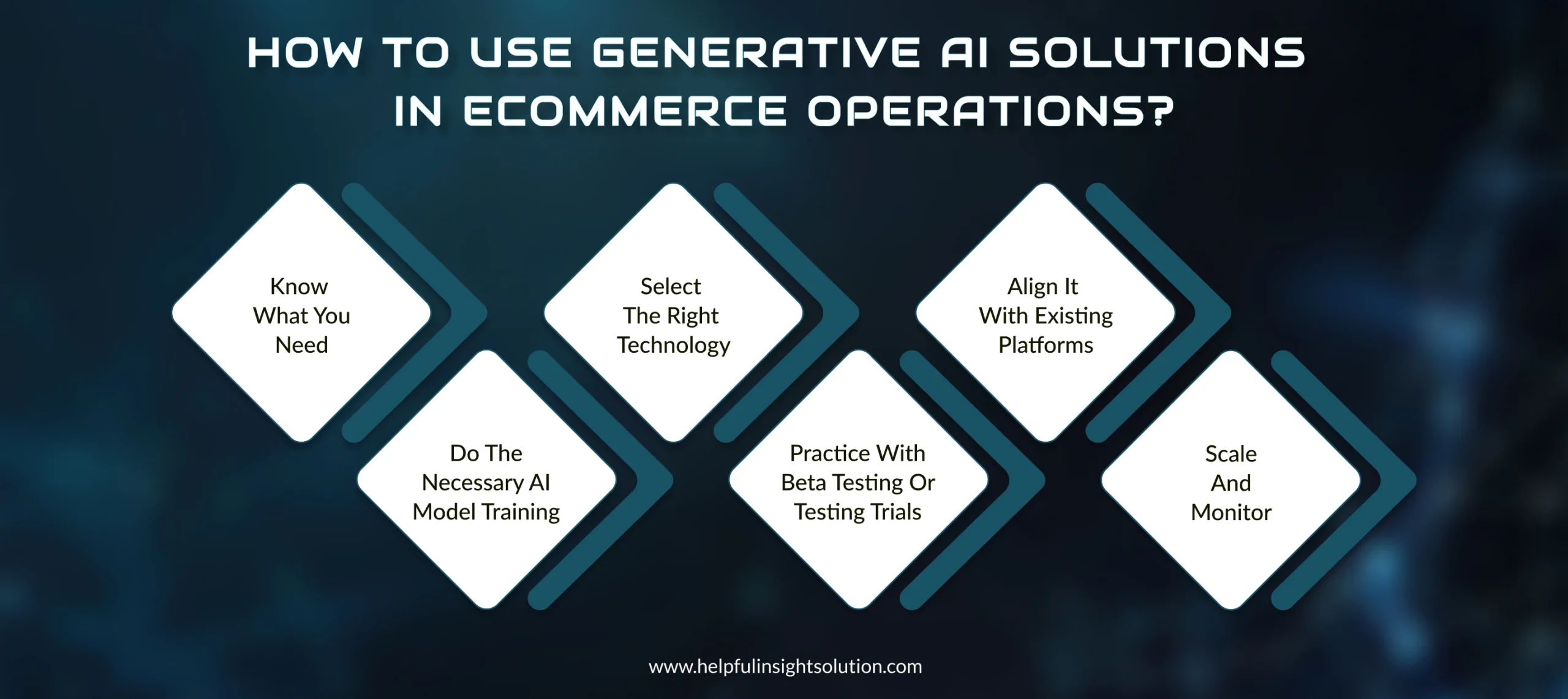
1. Know What You Need
Choose an area in which AI can function the best. It should be like where you can measure results quickly and clearly. For example, product descriptions, what type of product listing you need, and many more.
2. Select the Right Technology
To implement generative AI solutions in eCommerce operations, you should know the right technology stack to use. It depends on what AI platforms you are using, and accordingly, technology is integrated. You can even hire mobile app developers in Australia to see which technology is suited best for a particular e-commerce app and how to develop country country-specific app.
3. Align it with Existing Platforms
You can ensure the smooth integration of Generative AI solutions with your ERP, CRM e-commerce platforms. When you tend to do so, then it will increase the operational efficiency and even uplift the business platforms effectively. Also, there are several generative AI business applications that can easily be integrated.
4. Do the Necessary AI Model Training
You can even personalize AI models accordingly to user preferences and current market trends happening in your niche. It helps the AI chatbots to give you the best results for what you are asking for.
5. Practice with Beta Testing or Testing Trials
Before using the generative AI application, you can do the testing before by targeting a small group of customers’ database or products. You can analyze anything, whether the app has conversion rates, increased operational efficiency, etc. It is up any you to see what you want next.
6. Scale and Monitor
Once you have proven the ROI with your testing trials. You must continuously check that the key performance indicators are accurate for your AI solutions to know the cost-effectiveness of generative AI in e-commerce platforms.
Why Choose Helpful Insight for Integrating Generative AI in eCommerce?
If you are you are starting an eCommerce business and want exciting eCommerce business startup ideas, our team is here to help. Being a leading eCommerce app development company in New York, Helpful Insight has helped enterprises use AI and ML to innovate their business processes. We provide flexible business models that help in creating your generative AI apps, and with that, you can even hire our services as per your requirements. You can get in touch with our experts right now to get an overview of how to use AI in your e-commerce business!
FAQs
To use generative AI in eCommerce, it comes with a simple step-by-step procedure. You can start by analyzing in which area AI can be implemented, collecting the customer information, doing the testing, integrating it with other systems, and then scaling your vision.
Generative AI in eCommerce minimizes operational costs by automating tasks, optimizing processes, and enhancing efficiency. By reducing the cost of manpower, AI has significantly reduced the costs. It has streamlined the work even more, making the process faster and increasing profitability.
Generative AI can affect business operations by reducing operational costs and streamlining the work process. It replaces human labour costs and frees them from doing the work. Even if you wish to develop a mobile app with AI integration, you can do that too.
On the customer side, Amazon is implementing Generative AI to provide product suggestions and descriptions based on their shopping choices. The system can analyze customers’ choices to create custom recommendation categories and adjust product descriptions to showcase relevant features.





